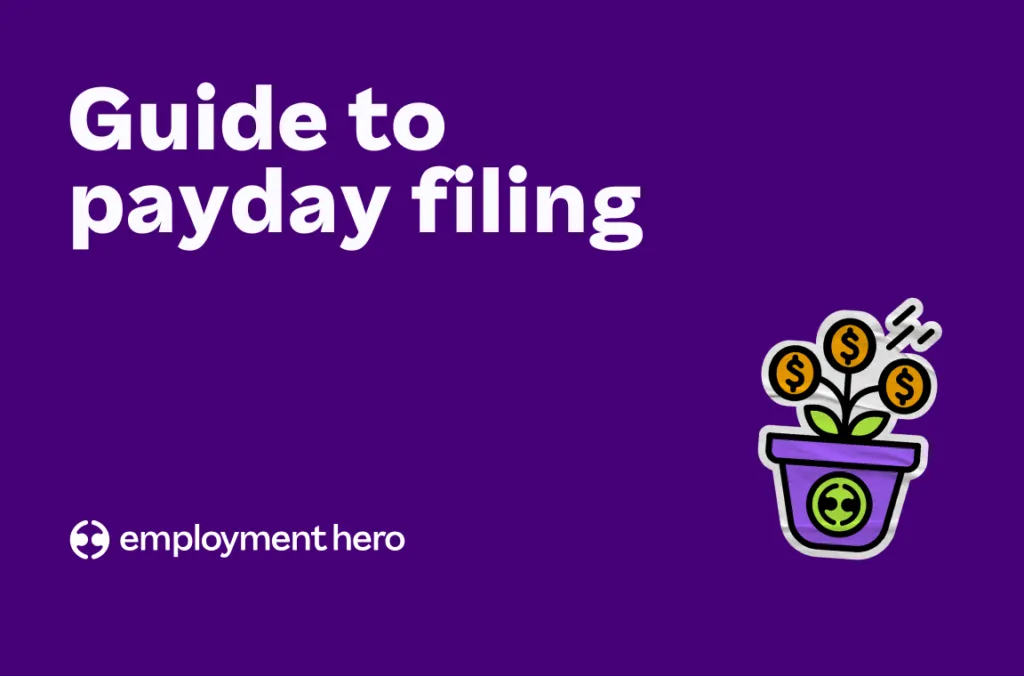Payday filing guide for New Zealand employers

Contents
Managing payroll is a core responsibility for any New Zealand business. A critical part of the payroll process is payday filing, which involves reporting your employees’ payroll information to Inland Revenue (IRD) every time you pay them. It’s a legal obligation for every employer in the country.
This guide will walk you through everything you need to know about payday filing in New Zealand. We will cover what it is, your obligations, key deadlines, common mistakes and how modern payroll software can simplify the entire process.
What is payday filing?
Payday filing is the system employers use to report employment information to Inland Revenue for each pay run. The purpose is to provide IRD with timely payroll data every time you pay your staff. Filing is based on the ‘on-payment date’, which is the day the money is physically paid to your employees.
This requirement applies to all employers in New Zealand. The standard method for filing is digitally, either through payroll software or IR’s myIR service.
Each time you file, you submit Employment Information (EI). This includes key details for each employee paid in that cycle, such as:
- Gross earnings
- Pay as you go (PAYE) income tax
- Employer superannuation contribution tax (ESCT)
- KiwiSaver deductions and contributions
- Student loan repayments
- Child support deductions
What are the benefits of payday filing?
Payday filing may be a legal obligation but it does also have some benefits for employers and employees alike. Firstly, it provides greater transparency for both employees and Inland Revenue. Employees can see their up-to-date earnings and deduction information in their myIR account, which helps them manage their tax obligations more effectively.
This process can also improve compliance for employers by aligning tax reporting with your natural pay cycle, reducing the likelihood of large, hard-to-fix errors at the end of the month. Because information is sent more frequently, mistakes are often smaller and can be identified and corrected faster. This leads to more accurate and up-to-date employee entitlements, such as KiwiSaver and student loan balances.
How does payday filing work?
The process follows a logical sequence that becomes a natural extension of running your payroll.
First, you process your payroll as you normally would, calculating wages and all necessary deductions. Before finalising, you should validate that all employee details, like IRD numbers and tax codes, are correct. Your payroll system then generates the employment information file.
You must submit this information to IRD within two working days of the employee’s payment date. A ‘working day’ is any day from Monday to Friday, excluding national public holidays. If a payday falls on a weekend, the two-day clock starts on the next working day.
As part of this filing, you will also report details for any new employees before their first payday and include any departing employees in their final pay filing. After submitting the file, you reconcile your figures and prepare to pay the total deductions to Inland Revenue by the due date.
What compliance obligations do employers have with payday filing?
As an employer, you have several ongoing obligations to remain compliant with the payday filing rules.
The most critical rule is timeliness. You must submit your employment information within two working days of every payday. The data you provide must also be accurate, covering everything from employee IRD numbers and tax codes to the calculation of earnings and deductions.
You are required to notify IRD of new starters and employees who have ceased their employment as part of your regular filing. All payroll records, including time sheets, leave records, and submitted files, must be kept for at least seven years. You also have a responsibility to handle sensitive employee data securely and in line with privacy laws.
If you discover an error, you must correct it promptly. Failing to meet these obligations can lead to issues. Late or incorrect filing may result in penalties and interest charges from Inland Revenue.
When do you pay PAYE?
After you have filed your employment information for each payday in a month, you must pay the total PAYE and other deductions to Inland Revenue. The due date for this payment depends on the size of your annual PAYE and ESCT deductions.
- Standard monthly payers (most businesses) must pay by the 20th of the month following the paydays. For example, all deductions for pays made in May are due by 20 June.
- Twice-monthly payers (large employers) have two payment dates. Deductions for paydays between the 1st and 15th of the month are due by the 20th of that same month. Deductions for paydays from the 16th to the end of the month are due by the 5th of the following month.
If a payment due date falls on a weekend or a public holiday, the payment is due on the next working day.
Common payday filing mistakes and how to avoid them
Even with the best intentions, errors can happen. Being aware of common pitfalls is the first step to avoiding them.
Late submissions are a frequent problem. This often occurs when manual processes or last-minute approvals delay the payroll run. Using payroll software with built-in reminders can help you stay on track.
Incorrect employee data, such as wrong IRD numbers or tax codes, can cause filing rejections and incorrect tax calculations. It is good practice to verify these details during onboarding. Similarly, missing KiwiSaver or ESCT settings can lead to compliance issues.
Misreporting special payments like bonuses, final holiday pay, or leave cash-ups is another common mistake. These often have specific tax rules that must be applied correctly. Finally, a simple failure to reconcile figures before submitting can cause discrepancies between your payroll records and what you report to IRD. A quick review can prevent this.
How to use Employment Hero for payday filing
Employment Hero is an all-in-one platform designed to make managing your HR and payroll straightforward. It streamlines payday filing by integrating directly with Inland Revenue.
It helps by offering direct IRD integration, allowing you to submit your payday files from the platform in just a few clicks. The system provides automatic calculations for PAYE, ESCT, KiwiSaver, student loans and child support deductions. Submissions are generated based on your employees’ payment date, keeping you compliant with IRD deadlines.
Employee self-service also empowers your team to update their own personal details, which reduces admin for you. With an audit trail, role-based security access and a suite of standard reports, you have complete oversight. Our dedicated local team can also provide support and onboarding to ensure your payroll runs smoothly.
Ready to streamline your payday filing? Learn more about Employment Hero’s NZ payroll software today.





















